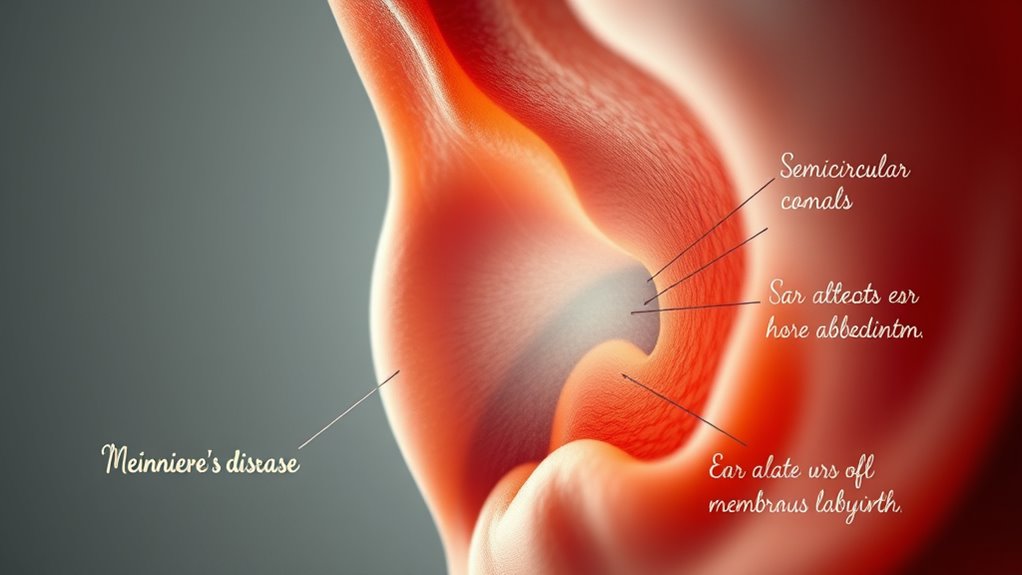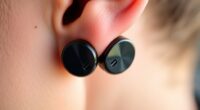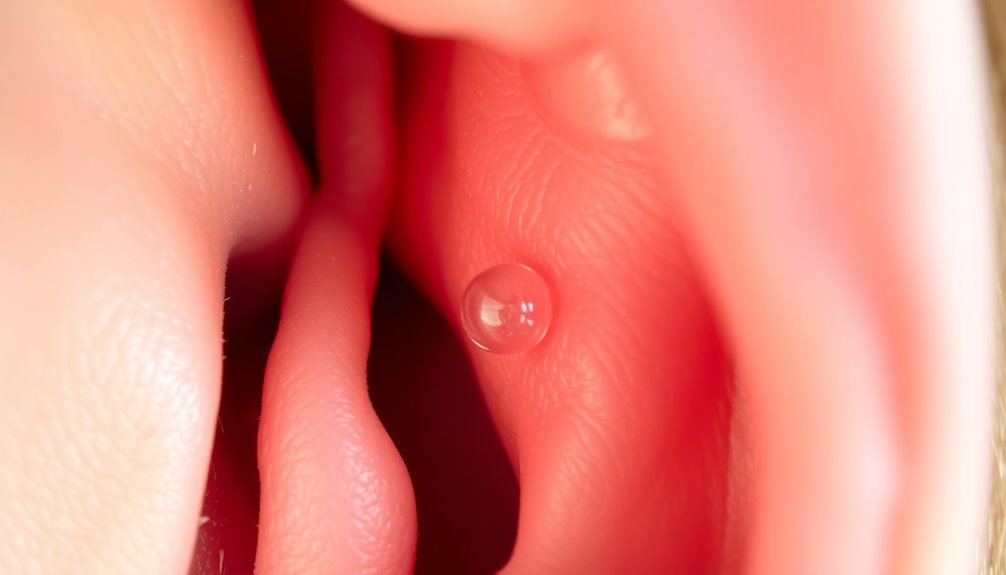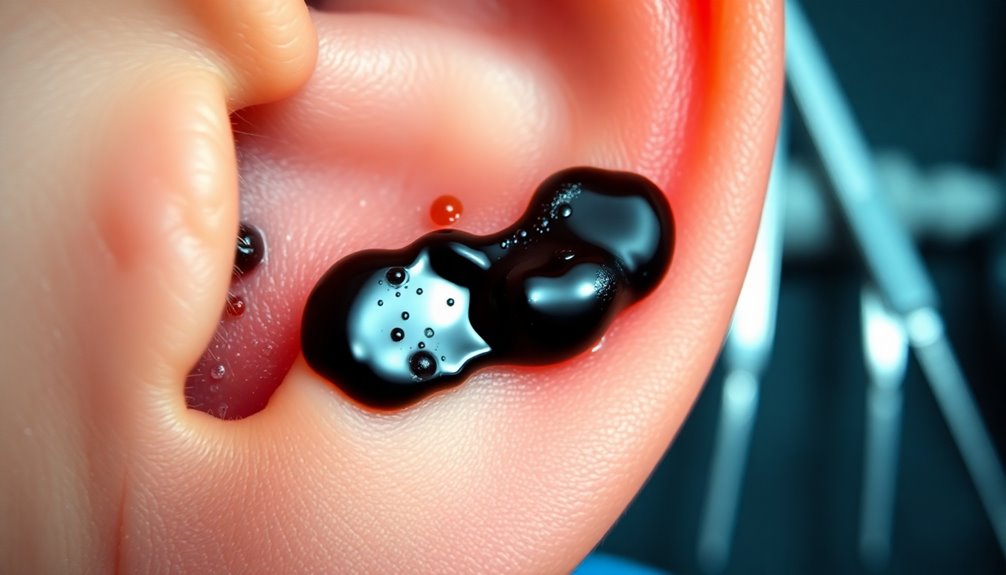Ménière’s disease is a chronic inner ear condition that disrupts your balance and hearing. It causes unpredictable episodes of vertigo, ringing in the ear, and fluctuating hearing loss due to excess fluid buildup in your inner ear. This can affect your daily life and stability. Understanding its symptoms, causes, and treatment options can help you manage the condition effectively. Keep exploring to discover ways to cope and the latest research offering hope for the future.
Key Takeaways
- Ménière’s disease is a chronic inner ear disorder causing vertigo, hearing loss, tinnitus, and a feeling of fullness in the ear.
- It results from excess fluid buildup in the inner ear’s labyrinth, disrupting balance and sound transmission.
- Symptoms include unpredictable episodes of vertigo, fluctuating hearing loss, ringing in the ear, and pressure sensations.
- Risk factors include genetic predisposition, ear injuries, infections, loud noise exposure, and autoimmune responses.
- Management involves medications, lifestyle changes, and sometimes surgical procedures to control symptoms and prevent progression.
What Is Ménière’s Disease?
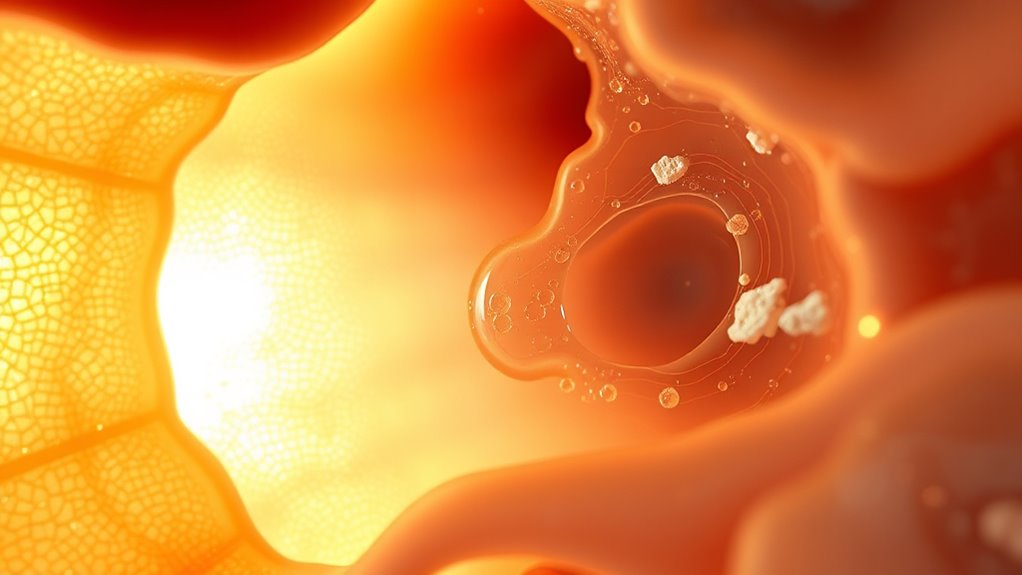
What is Ménière’s disease? It’s a chronic inner ear disorder that affects your balance and hearing. You might notice sudden episodes of vertigo, feeling like the room is spinning, or experience fluctuating hearing loss. The condition occurs when excess fluid builds up in your inner ear’s labyrinth, disrupting normal function. This buildup can cause pressure and damage to the delicate structures responsible for balance and sound transmission. Although the exact cause isn’t always clear, factors like genetics, allergies, and autoimmune responses can contribute. Wall organization systems can be incorporated into home decor to help create a calming environment for those managing symptoms. Ménière’s disease typically develops in one ear but can affect both over time. It’s a long-term condition that varies in severity, often requiring ongoing management to reduce symptoms and improve quality of life.
Common Symptoms and Signs
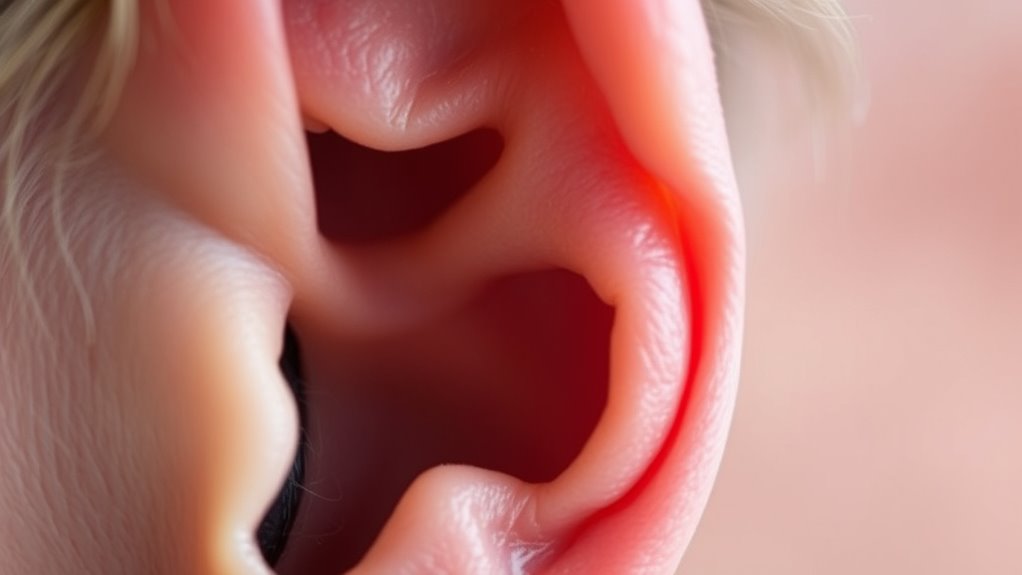
You may notice a range of symptoms that come and go unpredictably with Ménière’s disease. These signs can be sudden and often disrupt your daily life. Common symptoms include:
- Vertigo – A spinning sensation that can last from a few minutes to several hours, making you feel unsteady or dizzy.
- Hearing Loss – Usually temporary at first, but it can become more persistent over time, often affecting one ear.
- Tinnitus – A ringing, buzzing, or roaring sound in your ear that may fluctuate or become constant.
Other signs might include a feeling of fullness or pressure in the affected ear. These symptoms can occur individually or together, varying in intensity and frequency. Effective management often depends on understanding symptom patterns, which can be influenced by various factors.
Causes and Risk Factors
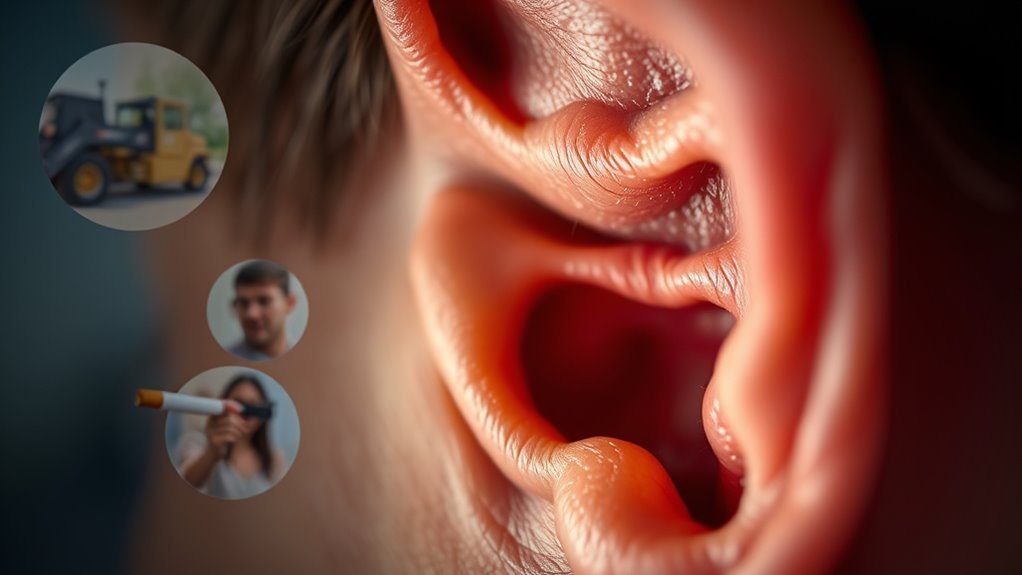
You might be more susceptible to Ménière’s Disease if you have a family history of it, pointing to genetic predispositions. Inner ear damage from injury or infections can also increase your risk. Understanding these factors can help you identify potential causes and take steps to protect your ear health. Additionally, public health initiatives aim to raise awareness and promote early detection of ear-related conditions.
Genetic Predispositions
Genetic factors can play a significant role in increasing the risk of developing Ménière’s disease. If you have a family history of the condition, you might be more susceptible. Certain genes may influence your inner ear’s structure or fluid regulation, making you prone to the disease. Researchers are still studying these genetic links, but some patterns suggest inheritance could be involved.
Here are three key points:
- A family history increases your risk of developing Ménière’s.
- Specific gene mutations might affect inner ear fluid balance.
- Genetic predisposition could interact with environmental triggers.
While genetics aren’t the sole cause, they can make you more vulnerable, especially when combined with other risk factors. Understanding your family history can help in early detection and management.
Inner Ear Damage
Inner ear damage is a primary cause of Ménière’s disease, often resulting from injury, infections, or prolonged exposure to loud noises. If you experience a blow to the head or ear, it can harm the delicate structures inside, disrupting fluid balance. Ear infections, especially inner ear labyrinthitis, can inflame tissues and impair function, increasing your risk. Likewise, frequent exposure to loud environments—like concerts or construction sites—can damage hair cells and interfere with fluid regulation. These factors can lead to abnormal fluid buildup in the cochlea and vestibular system, triggering Ménière’s symptoms. Being aware of these risks helps you take precautions—such as wearing ear protection or seeking prompt treatment for ear infections—to reduce your chances of developing the condition. Inspirational quotes about fatherhood can serve as a reminder of the importance of caring for your health and well-being to prevent such issues.
How Ménière’s Affects the Ear
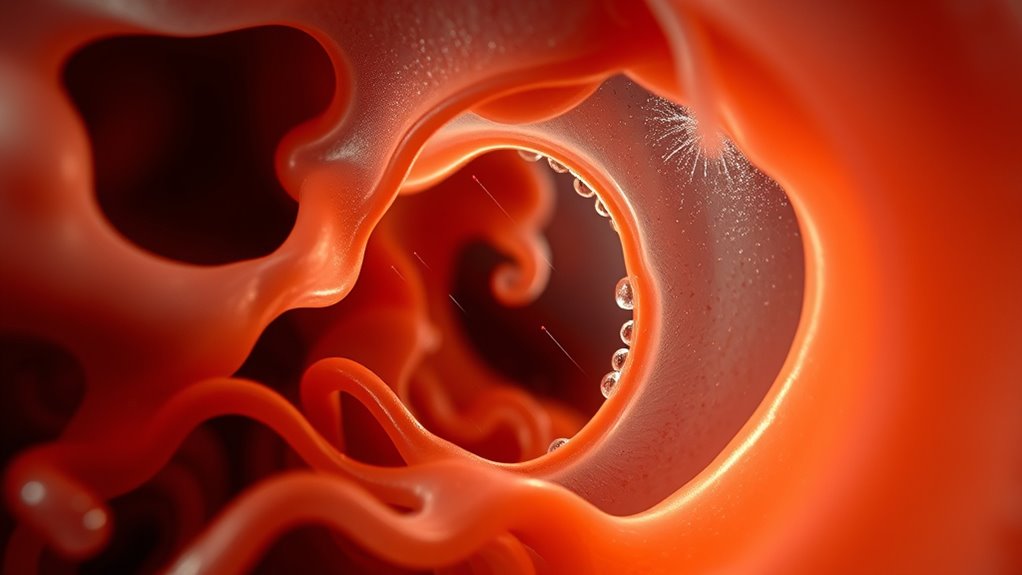
Ménière’s disease primarily disrupts the inner workings of the ear by causing abnormal fluid buildup in the cochlea and vestibular organs. This excess fluid distorts the normal balance and hearing signals your ear sends to your brain. As a result, you may experience unpredictable symptoms. Here’s how it affects you:
Ménière’s disease causes fluid buildup, disrupting ear signals and leading to unpredictable hearing and balance issues.
- Hearing Loss: The fluid pressure damages the delicate hair cells in the cochlea, leading to fluctuating hearing loss, especially in low tones.
- Vertigo: The vestibular organs become overstimulated, causing spinning sensations and balance issues during attacks.
- Tinnitus: You might notice constant ringing or buzzing in your ear, which worsens with fluid imbalance.
This combination considerably impacts your daily activities and sense of stability.
Additionally, managing inner ear health can help reduce the severity of symptoms and improve quality of life.
Diagnosing the Condition

How is Ménière’s disease diagnosed? You’ll start with a detailed medical history, describing your episodes of dizziness, hearing loss, and tinnitus. Your doctor will perform hearing tests, like audiometry, to assess your hearing levels and detect any loss. Balance tests, such as ENG or VNG, help evaluate your inner ear and brain coordination. Sometimes, imaging scans like MRI or CT are ordered to rule out other conditions. There’s no single test that confirms Ménière’s, so diagnosis relies on your symptoms’ pattern and ruling out alternatives. Your doctor may also monitor your symptoms over time. Accurate diagnosis is vital for effective management, so be honest and thorough when discussing your experiences. Additionally, audiometric assessments can help identify specific hearing impairments associated with the condition.
Treatment and Management Options
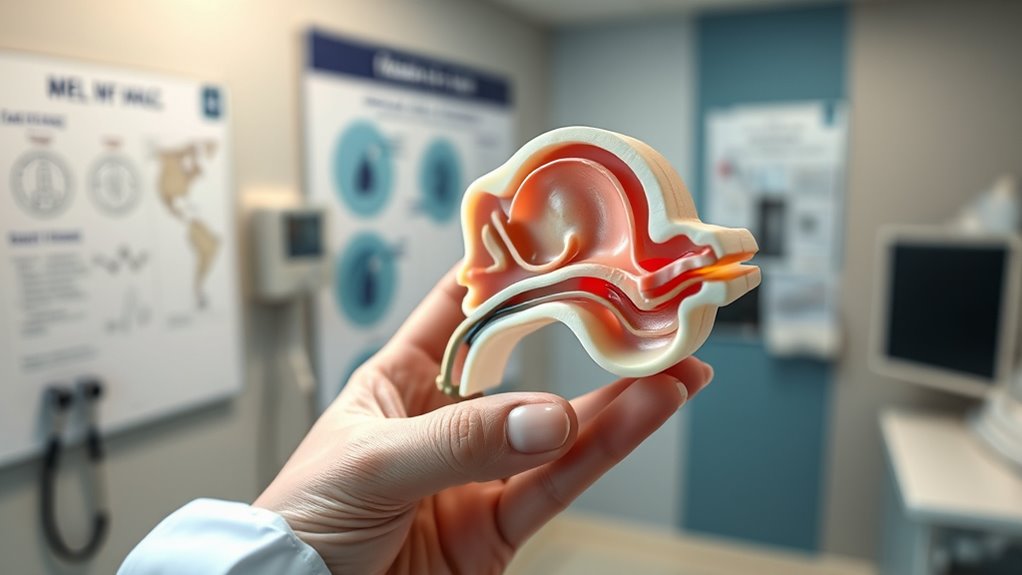
When managing Ménière’s disease, you’ll explore options like medications to control symptoms and ways to adjust your lifestyle and diet. You might also consider surgical procedures or alternative treatments if other methods don’t provide relief. Understanding these choices helps you develop a tailored plan to better handle the condition. Additionally, consulting with healthcare providers familiar with inner ear health can ensure you receive comprehensive care tailored to your specific needs.
Medication and Symptom Control
Managing symptoms of Ménière’s disease often involves medications that help control vertigo, tinnitus, and balance issues. These drugs can provide relief during attacks and reduce their frequency. Here are some common options:
- Antihistamines – They help lessen vertigo episodes by calming inner ear inflammation.
- Diuretics – These reduce fluid buildup in your ear, decreasing pressure and symptoms.
- Anti-nausea medications – They ease nausea and vomiting caused by vertigo attacks.
While medication can be effective, it’s important to follow your doctor’s instructions closely. Not all medications work the same for everyone, and some may have side effects. Always discuss your symptoms and treatment options thoroughly with your healthcare provider. Additionally, proper management of inner ear health and air quality can contribute to overall symptom control.
Lifestyle and Dietary Changes
Adopting specific lifestyle and dietary changes can substantially help manage Ménière’s disease symptoms. You should reduce salt intake to prevent fluid buildup in your inner ear, which can trigger vertigo episodes. Eating a balanced diet with plenty of fruits, vegetables, and lean proteins supports overall health and minimizes symptoms. Avoid caffeine, alcohol, and smoking, as these can worsen dizziness and balance issues. Managing stress through relaxation techniques like meditation or yoga can also reduce the frequency of attacks. Maintaining a regular sleep schedule helps stabilize your body’s internal balance, decreasing vertigo episodes. Staying well-hydrated is important, but avoid excessive fluid intake. Incorporating waterless planters into your environment can help maintain humidity levels and improve overall comfort. By making these adjustments, you can better control symptoms and improve your quality of life.
Surgical and Alternative Procedures
Surgical and alternative procedures offer targeted options for managing Ménière’s disease when lifestyle changes are insufficient. These treatments aim to reduce symptoms or improve balance. You might consider:
- Endolymphatic Sac Surgery – this relieves inner ear pressure by draining excess fluid, helping decrease vertigo episodes.
- Vestibular Nerve Section – this procedure cuts the nerve responsible for balance signals, often reducing vertigo while preserving hearing.
- Gentamicin Injections – this medication ablates overactive balance cells to control vertigo, but may slightly affect hearing.
While these options can be effective, they carry risks and aren’t suitable for everyone. Always consult your doctor to weigh benefits and potential side effects before proceeding with surgery or alternative treatments.
Lifestyle and Home Remedies

Lifestyle and home remedies can play a significant role in reducing the severity and frequency of Ménière’s disease symptoms. You can manage your condition better by adopting healthy habits and making simple adjustments. For example, reducing salt intake helps control fluid balance in your inner ear, preventing episodes. Staying well-hydrated but avoiding caffeine and alcohol minimizes triggers. Stress management techniques like yoga or meditation can reduce symptom severity. Regular sleep patterns support overall stability. Consider the table below for key strategies:
| Strategy | Why It Helps | Tips |
|---|---|---|
| Salt restriction | Decreases fluid retention | Limit processed foods |
| Hydration | Maintains inner ear balance | Drink water, avoid diuretics |
| Stress management | Reduces symptom triggers | Practice deep breathing |
| Sleep hygiene | Promotes stability and recovery | Keep a consistent sleep schedule |
Additionally, understanding the importance of fluid balance can help you make informed choices to prevent episodes.
Coping With Vertigo and Hearing Loss
Coping with vertigo and hearing loss caused by Ménière’s disease can be challenging, but understanding how to manage these symptoms can make a significant difference. You can take control by adopting practical strategies.
- Use balance aids like handrails or walking sticks to prevent falls during vertigo episodes.
- Manage stress through relaxation techniques such as deep breathing or meditation, which can reduce symptom severity.
- Protect your hearing by avoiding loud environments and using hearing aids if recommended, helping you stay connected and reduce frustration.
Ongoing Research and Future Therapies

Research into Ménière’s disease is advancing rapidly, offering hope for more effective treatments in the future. Scientists are exploring new medications, improved surgical techniques, and innovative therapies like gene therapy and stem cell research. These advancements aim to reduce symptoms, prevent progression, and restore quality of life. As you follow these developments, remember that each discovery brings you closer to better management options and potential cures. The journey is ongoing, but progress fuels optimism.
| Hope for the Future | Current Breakthroughs |
|---|---|
| New medications | Targeted drug delivery systems |
| Surgical innovations | Less invasive procedures |
| Gene therapy | Correcting genetic causes |
| Stem cell research | Regenerating damaged tissues |
| Ongoing trials | Testing safe, effective options |
Frequently Asked Questions
Can Ménière’S Disease Be Cured Permanently?
You might wonder if Ménière’s disease can be cured permanently. While there’s no definitive cure, treatments aim to manage symptoms effectively. You can reduce the frequency and severity of attacks through medication, diet changes, and lifestyle adjustments. In some cases, procedures or surgery may help. However, since the disease varies from person to person, ongoing management is essential, and complete, permanent relief isn’t always possible.
Are There Specific Foods to Avoid With Ménière’S?
You might wonder if certain foods worsen your symptoms. Research suggests that salt, caffeine, and alcohol can trigger or intensify vertigo and fullness. To manage your condition, avoid high-sodium foods like processed snacks and canned soups, limit caffeine from coffee and energy drinks, and cut back on alcohol. These changes help control fluid balance in your inner ear, reducing the frequency and severity of episodes.
How Does Stress Influence Ménière’S Symptoms?
Stress can notably worsen your Ménière’s symptoms. When you’re stressed, it triggers your body’s fight-or-flight response, which can increase fluid buildup in your inner ear, leading to more intense vertigo, tinnitus, and imbalance. You might notice these symptoms become more frequent or severe during stressful times. Managing stress through relaxation techniques, regular exercise, or therapy helps reduce these flare-ups and improves your overall quality of life.
Is Ménière’S Disease Hereditary?
You might think you’re out of luck if Ménière’s disease runs in your family, but it’s not a certainty. While genetics can play a role, it’s more of a piece of the puzzle rather than the whole picture. Environmental factors, lifestyle, and other health issues influence its development. So, don’t throw in the towel; focus on managing symptoms and keeping your health in check to stay one step ahead.
Can Children Develop Ménière’S Disease?
Yes, children can develop Ménière’s disease, though it’s rare. If you notice your child’s episodes of vertigo, hearing loss, or ringing in the ears, you should consult a doctor. Early diagnosis and management are vital to reduce symptoms and prevent long-term damage. While the disease primarily affects adults, children with specific symptoms shouldn’t be overlooked, and proper testing can help confirm whether they have it.
Conclusion
Living with Ménière’s disease can be challenging, but understanding it is the first step toward managing your symptoms and improving your quality of life. With the right treatments and lifestyle adjustments, you can regain control and reduce the impact of vertigo and hearing loss. Are you ready to take charge of your health and navigate this condition confidently? Remember, support and ongoing research are paving the way for better solutions—you’re not alone in this journey.
